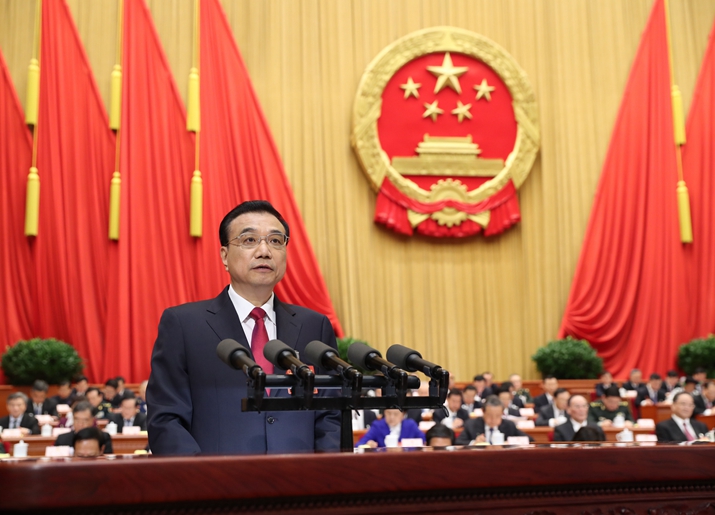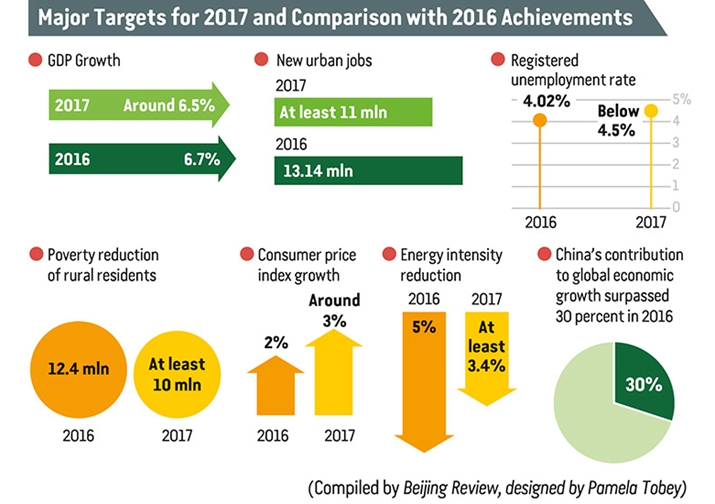|
||||||||||
| Home Nation World Business Opinion Lifestyle ChinAfrica Multimedia Columnists Documents Special Reports |
|
||||||||||
| Home Nation World Business Opinion Lifestyle ChinAfrica Multimedia Columnists Documents Special Reports |
| China |
| Premier Vows Expanded Reforms |
| Chinese Premier Li Keqiang’s Report on the Work of the Government describes key tasks for 2017 |
| By Bryan Michael Galvan | Web Exclusive ·2017-03-05 |

Chinese Premier Li Keqiang delivers a government work report during the opening meeting of the Fifth Session of China's 12th National People's Congress (NPC) in Beijing, capital of China, March 5, 2017 (XINHUA)
China seeks to expand its economy by 6.5 percent in 2017 as it aims to push through reforms on its financial, housing and employment sectors.
At the opening of the Fifth Session of the National People’s Congress on March 5, Chinese Premier Li Keqiang delivered the Report on the Work of the Government, which addressed various topics such as the development of emerging industries, urbanization and the environment.
Li stated that China will make greater efforts to implement innovation-driven development strategy, upgrade the real economy and improve its performance and competitiveness. "The real economy has always been the foundation of China’s development; the task we now face is to speed up its transformation and upgrading," said Li.
Nonetheless, China’s GDP growth target was less than last year’s target of 6.5 to 7 percent. In 2016, China’s GDP grew 6.7 percent year on year, its lowest rate in 26 years. In the same year, paid-in foreign investment in China amounted to more than $130 billion, the largest among all developing countries.
Increased debt levels and a burgeoning housing market in top tier cities have caused concern among China’s top leaders. Li said that China will continue to implement a proactive fiscal policy, stating, "This year’s deficit-to-GDP ratio is projected to be 3 percent, with the fiscal deficit set at 2.38 trillion yuan ($345 billion), representing a year-on-year increase of 200 billion yuan ($29 billion)."
The Report on the Work of the Government also planned reductions in taxes and fees. "Over the course of the year, the tax burden on businesses will be further eased by around 350 billion yuan ($51 billion), and business related fees will be further cut by around 200 billion yuan ($29 billion) to benefit market entities."

Jobs and cuts
State-owned enterprises and assets will also be targeted for reforms this year, said Li.
Supply-side reform is also prominent on the report, which pointed out overcapacity issues in the steel and coal sectors, involving mainly state-owned enterprises. According to Li, steel production capacity is to be further cut by around 50 million tons, and at least 150 million tons of coal production facilities are to be shuttered.
"As overcapacity is cut, we must provide assistance to laid-off workers," Li said, emphasizing that greater importance was being added to employment this year.
The government plans to create 11 million new urban jobs this year despite increasing employment pressures brought about by cuts in traditional industrial sectors.
The goal comes against the backdrop of the government’s attempts to create an economic "new normal" as outlined in the 13th Five-Year Development Plan (2016-20) which focuses on consumption rather than traditional growth engines. China’s target increase rate for its consumer price index in 2017 is 3 percent, one percentage point higher than last year’s rate.
Copyedited by Ni Yanshuo
Comments to niyanshuo@chinafrica.cn
| About Us | Contact Us | Advertise with Us | Subscribe |
| Copyright Beijing Review All rights reserved 京ICP备08005356号-5 京公网安备110102005860号 |